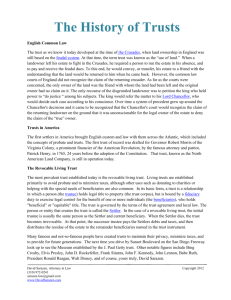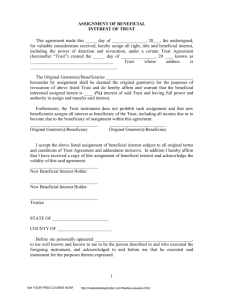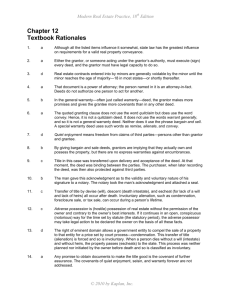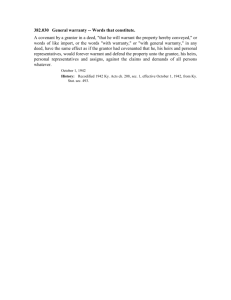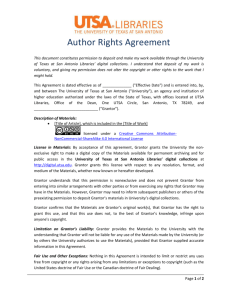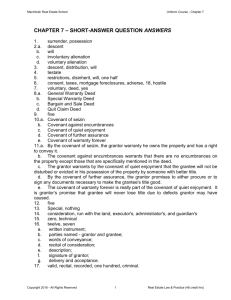Advantages and Disadvantages of a Revocable Living Trust
advertisement
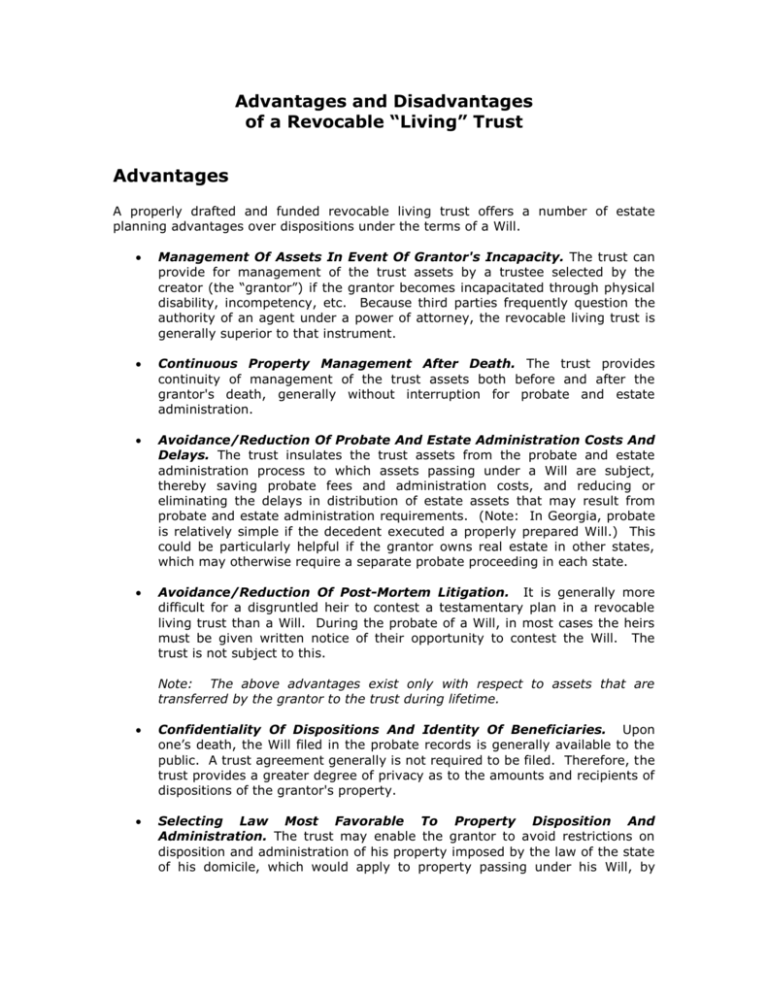
Advantages and Disadvantages of a Revocable “Living” Trust Advantages A properly drafted and funded revocable living trust offers a number of estate planning advantages over dispositions under the terms of a Will. Management Of Assets In Event Of Grantor's Incapacity. The trust can provide for management of the trust assets by a trustee selected by the creator (the “grantor”) if the grantor becomes incapacitated through physical disability, incompetency, etc. Because third parties frequently question the authority of an agent under a power of attorney, the revocable living trust is generally superior to that instrument. Continuous Property Management After Death. The trust provides continuity of management of the trust assets both before and after the grantor's death, generally without interruption for probate and estate administration. Avoidance/Reduction Of Probate And Estate Administration Costs And Delays. The trust insulates the trust assets from the probate and estate administration process to which assets passing under a Will are subject, thereby saving probate fees and administration costs, and reducing or eliminating the delays in distribution of estate assets that may result from probate and estate administration requirements. (Note: In Georgia, probate is relatively simple if the decedent executed a properly prepared Will.) This could be particularly helpful if the grantor owns real estate in other states, which may otherwise require a separate probate proceeding in each state. Avoidance/Reduction Of Post-Mortem Litigation. It is generally more difficult for a disgruntled heir to contest a testamentary plan in a revocable living trust than a Will. During the probate of a Will, in most cases the heirs must be given written notice of their opportunity to contest the Will. The trust is not subject to this. Note: The above advantages exist only with respect to assets that are transferred by the grantor to the trust during lifetime. Confidentiality Of Dispositions And Identity Of Beneficiaries. Upon one’s death, the Will filed in the probate records is generally available to the public. A trust agreement generally is not required to be filed. Therefore, the trust provides a greater degree of privacy as to the amounts and recipients of dispositions of the grantor's property. Selecting Law Most Favorable To Property Disposition And Administration. The trust may enable the grantor to avoid restrictions on disposition and administration of his property imposed by the law of the state of his domicile, which would apply to property passing under his Will, by allowing him to choose the more favorable law of another state to apply to the disposition and administration of the property placed in the trust. Flexibility In Disposition Of Estate. The trust provides a flexible vehicle for disposing of the grantor's property after his death, which can, if desirable, mirror the disposition which he would have provided in a Will, and which can readily be changed to reflect changes in the estate plan. To Act As Receptacle For Non-Probate Assets. The trust can act as a receptacle for non-probate assets (life insurance proceeds, retirement plan death benefits, etc.) after death to coordinate their disposition under the plan with other assets. To Receive Retirement Benefits. If one wishes for any of his retirement benefits to pass in trust for a beneficiary (versus passing outright), then it may be necessary to create a revocable living trust to receive the benefits in the event of the owner’s death. If an individual is named as beneficiary, then that individual beneficiary is generally able to immediately withdraw the funds. If the beneficiary is a minor, or is otherwise unsuited to receive a full distribution, then a trust should be used. One option would be to create such a trust in the Will, and name that trust as beneficiary. However, financial institutions are sometimes reluctant to recognize such a designation. If the owner names his “estate” as the beneficiary, then it should generally pass through the Will and into the trust. However, this will generally cause the benefits to lose their tax-deferred status, and possibly protection from creditor claims. Creating a separate revocable trust during lifetime for the sole purpose of receiving retirement benefits upon the death of the grantor is often the best solution to these problems. Disadvantages There are also some disadvantages when a revocable living trust is used to dispose of the grantor's assets. Immediate Expenses For Drafting The Trust Agreement And Transferring Grantor's Assets To The Trust. Legal fees for drafting a revocable living trust (and pour-over Will) and overseeing the funding of the trust will be incurred. Other costs may be incurred in re-titling assets. Fiduciary Income Tax Returns May Have To Be Prepared. Unless the grantor is the sole trustee or a co-trustee, a fiduciary income tax return may have to be prepared for each year the trust is in existence, thereby incurring extra accounting fees. Other than that, there are generally no income tax disadvantages to using a revocable living trust since the trust qualifies as a “grantor trust” under the income tax laws. Inconvenience of Holding Assets in the Name of the Trust. Some people may find the ownership of assets in the name of “______, Trustee under Trust Agreement dated ___, for benefit of ______” less convenient than owning the property in their own names. Also, third parties (such as banks and investment firms) may impose administrative procedures when a trust is used. 2 Additional Complexity If All Assets Are Not Transferred To The Trust. If the grantor does not transfer all of his assets into the trust during lifetime, then the administration of the estate could actually be more complicated. This is because a typical “pour-over” Will first requires that probate assets be transferred into the trust before being distributed to the beneficiaries. This can result in additional delay and transfer costs. Misconceptions Some promote revocable living trusts for incorrect reasons. things that such a trust will not do. Here are some Will Not Reduce Taxes. A revocable living trust does not save any income or estate taxes. The property in the trust is still counted as owned by the grantor for tax purposes. The successor trustee still has to pay income taxes generated by the trust property after the grantor’s death. If the grantor’s estate is large enough to trigger federal or state estate or inheritance taxes, the successor trustee has to file the appropriate tax returns. Will Not Make A Will Unnecessary. The grantor will still need a Will to take care of assets that are not transferred to the trust during lifetime, or that are acquired shortly before death. If the grantor has minor children, he will need a Will to appoint a guardian for them. Will Not Affect Nonprobate Assets. Like a Will, a revocable living trust will not control the disposition of jointly owned property, life insurance payable to another beneficiary, or other nonprobate property. Will Not Protect Your Assets From Creditors. Creditors of the grantor can usually reach the assets in a revocable living trust for debts of the grantor. In fact, the assets placed in a trust are not subject to probate administration, and thus could lose the protection of the statute of limitations - creditors may have longer to get at them. Also, the grantor’s family does not receive the family allowance granted for a probate estate, which sets aside a certain amount of money for family support that takes priority over creditors’ claims. An irrevocable trust can sometimes help shield a grantor’s assets from creditors, but this can be a somewhat complex undertaking. Will Not Absolutely Protect Your Assets From Disgruntled Heirs. While it is harder to challenge a revocable living trust than a Will, a relative can still attempt to legally challenge the trust on the grounds of lack of mental capacity, undue influence, duress, or for other reasons. Will Not Entirely Eliminate Delays. A revocable living trust might well lessen the time it takes to distribute assets after the grantor’s death, but it will not completely eliminate delays. Many state laws impose a waiting period for creditors to file claims against estates of people with such trusts. The period usually is not as long as the time required to probate a Will, but can stretch into several months. The trustee will still have to collect debts owed to the grantor, prepare tax returns, and pay bills and distribute assets, in the same manner as an executor of a Will. I:\Marketing\DLW MASTER - Revocable Trusts Pros and Cons.DOC 3
